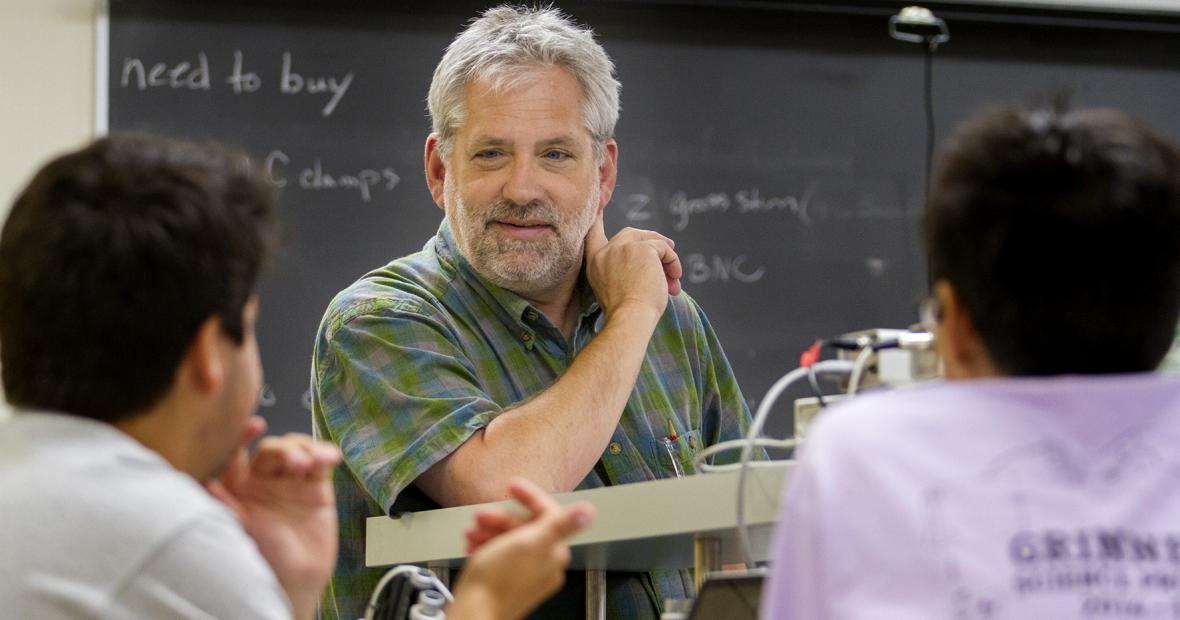Clark Lindgren, Iowa Professor of the Year
Clark Lindgren, Patricia A. Johnson Professor of Neuroscience and professor of biology, has been selected as the 2015 Iowa Professor of the Year.
The U.S. Professors of the Year Awards Program honors excellence in undergraduate instruction, recognizing professors who profoundly influence the lives and careers of their students. Lindgren is one of 35 state winners from across the nation.
A member of Grinnell's faculty since 1992, Lindgren has strived, as both a professor and an adviser, to help students from groups traditionally underrepresented in the sciences overcome external challenges and find success in scientific fields. He served as an early faculty director of The Grinnell Science Project, which is designed to increase retention and success of science students from backgrounds underrepresented in STEM fields.
The former students who wrote letters of recommendation for Lindgren have been successful despite external challenges they faced because of their background. Lindgren said, "For each student I try to be appropriately demanding and yet encouraging at the same time, and that to me is really the essence of what good teaching is about – finding that balance."Lindgren has continued to advise these students past graduation. One former student and nominator, who described herself as "woefully unprepared" to meet the expectations of the biology department when she arrived at Grinnell, said she owes much of her success to Lindgren. By graduation, she had been selected as a Rhodes Scholar, which she applied for at the encouragement of Lindgren, and later went on to the Johns Hopkins School of Medicine, the Bloomberg School of Public Health, and the Johns Hopkins Sydney Kimmel Cancer Center.
"I have achieved more, reached further, and contributed that which I would not have been able to otherwise because of Professor Lindgren's investment in me as a teacher and as a mentor," she wrote. "I would not be the learner, the teacher, or the cancer doctor I am today, were it not for him."
In addition to helping students pursue their goals in and out of the classroom, Lindgren is a pioneer of engaging, authentic, and interdisciplinary biology teaching methods. He was a co-architect of the upside-down biology curriculum, in which students are immersed in research from their first biology course. Now emulated across the country, the biology 150 course is, according to a colleague and nominator, "an important transition from faculty-centered teaching to student-centered learning."
Lindgren also helped create Grinnell's neuroscience concentration, now one of the largest concentrations on campus. The neuroscience concentration's curriculum, which attracts students from all majors and divisions, is interdisciplinary, including courses from biology, psychology, social sciences, and the humanities.
A celebrated professor and adviser, Lindgren is also being recognized for his scholarship. For the past three decades, he has been working to understand the remarkable ability of chemical synapses, the nexus between individual neurons, to change their behavior in response to the activity they experience. He has authored articles in 16 peer-reviewed publications.
Lindgren includes students in his research. Since arriving at Grinnell, he has worked closely with 64 undergraduate students researchers, almost 70 percent of whom have gone on to graduate school in neuroscience or a related field.
An engaged member of the Grinnell faculty, Lindgren has served as the chair of the biology department twice, the chair of the science division, and on various college-wide committees, such as the Personnel Committee and Executive Council, a faculty advisory committee to the president and dean.
For Lindgren, this award is a testament to the outstanding students and colleagues he works with each day at Grinnell.
The Council for Advancement and Support of Education launched the U.S. Professors of the Year Awards Program in 1981. That same year, the Carnegie Foundation for the Advancement of Teaching began hosting the final round of judging, and in 1982, became the primary sponsor.
The program awards four national winners and one winner from each state every year.
Professors are judged on four criteria:
- impact on and involvement with undergraduate students;
- scholarly approach to teaching and learning;
- contribution to undergraduate education in the institution, community, and profession; and
- support from colleagues and former undergraduate students.
The Carnegie Foundation for the Advancement of Teaching is an independent policy and research center that supports needed transformations in American education through tighter connections between teaching practice, evidence of student learning, the communication and use of this evidence, and structured opportunities to build knowledge.

